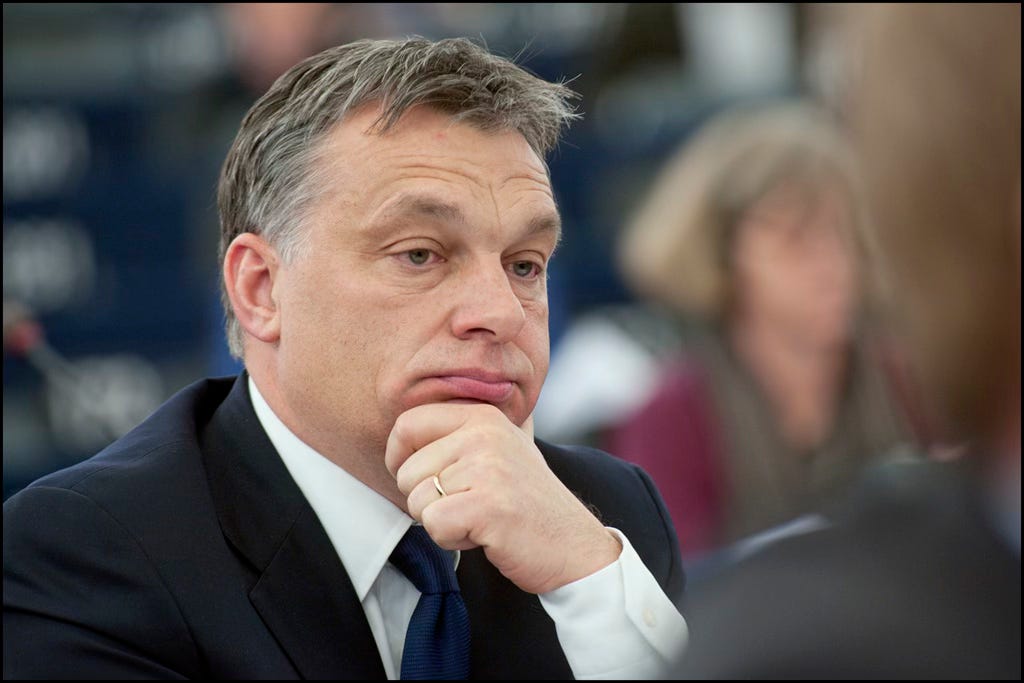
Discover more from Arc Digital
The Goulash Stands Alone
Hungary once again forges a lonely path. But unlike in 1956, there’s little to celebrate.
In October of 1956, the people of Hungary rebelled against the country’s Soviet bloc government. The U.S.S.R. quickly acted to squash this intolerable expression of political independence within its sphere of influence. It was a doomed revolution, ennobled by the willingness of Hungarian revolutionaries to stand against the Stalinist goliath and the images of Soviet tanks rolling through Budapest. Today, it serves as a key event in the modern history of the Hungarian nation and a reminder of the enduring independent and pro-democratic spirit of its people.
Hungary marked itself out among the other European states behind the Iron Curtain by adopting idiosyncratic policies that fused elements of Western capitalism with Soviet-style central planning. This system of economic bric-a-brac came to be called Goulash Communism in honor of the ad hoc recipe history of that national dish.
In recent years, Hungary and Poland have formed an illiberal bloc within the European Union. Poland, too, pursued anti-immigrant and anti-LGBTQ policies, as well as a draconian anti-abortion agenda. Officials in Brussels struggled to manage this right-wing dyad, as the two nations worked to block any disciplinary actions against the other. The unanimity requirements of Article 7, under which the EU can enforce its justice and rights standards against member states, meant that Budapest and Warsaw could effectively protect and enable one another.
But, unlike the success of Viktor Orbán’s ruling Fidesz party in last year’s Hungarian elections, Poland’s Law and Justice failed this October to win enough seats to continue on in government, despite still being the country’s largest party, as opposition parties obtained a parliamentary majority. Nevertheless, President Duda has asked outgoing Prime Minister Morawiecki to attempt to form a government. This is likely to prove challenging, and it remains hard to sugarcoat Law and Justice’s electoral setbacks.
Officials from Law and Justice have cast some blame on Hungarian advisers who, they claimed, insisted that the Fidesz model could be easily imported into the Polish context to guarantee electoral success. Law and Justice officials have since complained, "The Hungarians claimed all we had to do was translate what worked for them into our strategy and we would win. They just did not take into account the specifics of the Polish election system and the overall mood of society"
Orbán also recently broke with Hungary’s NATO allies by giving Vladimir Putin his first meeting with a major European leader since the invasion of Ukraine in 2022. The symbolism of the moment did not go unobserved.
Pro-democracy activists in Hungary noted the grim symmetry between Orbán’s meeting with Putin during the anniversary of the 1956 uprising. Katalin Cseh, an MEP for Hungary’s liberal Momentum Movement, posted on X, “Orbán shook hands with Putin just a few days before October 23— the day our nation commemorates the revolution of 1956. He shook hands with a war criminal, whose regime calls our freedom fight a ‘fascist uprising.’ Unforgivable shame.”
Turkey’s recent softening on Sweden’s accession to NATO has added further pressure on Hungary. Sweden has reiterated confidence that Hungary will support their accession, but Budapest and Ankara have been the only real speed bumps in adding the Scandinavian country to the alliance.
Slovakia’s newly elected government offers the only real bright spot for the Orbánist agenda. Prime Minister Robert Fico has been firm in his opposition to continuing aid to Ukraine, stating, "I will support zero military aid to Ukraine.” Fico, who has opposed sanctions against Russia, has also insisted that, “An immediate halt to military operations is the best solution we have for Ukraine." So, Slovakia could well prove to be a meaningful new ally for Hungary in undermining European support for Ukraine. This would likely be welcome since friends are in short supply, as social media users were quick to point out during October’s EU summit.
Most recently, Orbán’s government has indicated it will block EU accession for Ukraine. This comes in response to Ukrainian laws requiring most childhood education to be conducted in the Ukrainian language, something the Hungarian government maintains is discriminatory against Hungarian speakers living in Ukraine. With the EU’s unanimity requirements, Hungary and any other illiberally-inclined state in the EU can single-handedly undermine attempts to bring Ukraine closer into the European fold. And a single-minded focus on the Hungarian national community, indulging its European diaspora, has proven to be a domestically profitable strategy for Orbán in the past.
Still, the turmoil in Poland, and Russia’s increasing isolation, pose real problems for Orbán’s future. His domestic opponents are right to take some heart from recent weeks. Whereas the Fidesz model proved unable to help Law and Justice trample their opponents, we will have to see if the success of Poland’s pro-democracy groups can offer inspiration for those hoping to bring an end to the Orbán era in Hungary. In the meantime, he cuts an increasingly lonely figure on the European stage.
Subscribe to Arc Digital
Independent media site covering politics, culture, and society. Go beyond the echo chambers.






